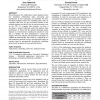Free Online Productivity Tools
i2Speak
i2Symbol
i2OCR
iTex2Img
iWeb2Print
iWeb2Shot
i2Type
iPdf2Split
iPdf2Merge
i2Bopomofo
i2Arabic
i2Style
i2Image
i2PDF
iLatex2Rtf
Sci2ools
161
click to vote
CSCW
2011
ACM
2011
ACM
Scheduling in variable-core collaborative systems
The performance of a collaborative system depends on how two mandatory collaborative tasks, processing and transmission of user commands, are scheduled. We have developed multiple policies for scheduling these tasks on computers that have (a) one processing element on the network interface card and (b) one or more processing cores on the CPU. To compare these policies, we have a developed a formal analytical model that predicts their performance. It shows that the optimal scheduling policy depends on several factors including the number of cores that is available. We have implemented a system that supports all of the policies and performed experiments to validate the formal model. This system is a component of a self-optimizing scheduler we have developed that improves response times by automatically choosing the scheduling policy based on number of cores and other factors. Author Keywords Optimization; scheduling; multi-core; analytical model. ACM Classification Keywords C.2.4. [Comp...
Related Content
| Added | 28 May 2011 |
| Updated | 28 May 2011 |
| Type | Journal |
| Year | 2011 |
| Where | CSCW |
| Authors | Sasa Junuzovic, Prasun Dewan |
Comments (0)

